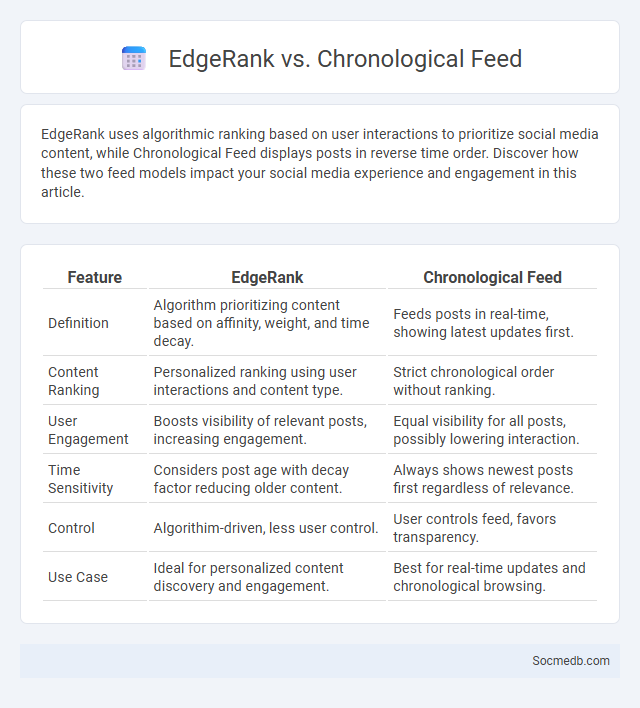
Photo illustration: EdgeRank vs Chronological Feed
EdgeRank uses algorithmic ranking based on user interactions to prioritize social media content, while Chronological Feed displays posts in reverse time order. Discover how these two feed models impact your social media experience and engagement in this article.
Table of Comparison
| Feature | EdgeRank | Chronological Feed |
|---|---|---|
| Definition | Algorithm prioritizing content based on affinity, weight, and time decay. | Feeds posts in real-time, showing latest updates first. |
| Content Ranking | Personalized ranking using user interactions and content type. | Strict chronological order without ranking. |
| User Engagement | Boosts visibility of relevant posts, increasing engagement. | Equal visibility for all posts, possibly lowering interaction. |
| Time Sensitivity | Considers post age with decay factor reducing older content. | Always shows newest posts first regardless of relevance. |
| Control | Algorithim-driven, less user control. | User controls feed, favors transparency. |
| Use Case | Ideal for personalized content discovery and engagement. | Best for real-time updates and chronological browsing. |
Understanding EdgeRank: A Brief Overview
EdgeRank is the algorithm that determines the visibility of content on social media platforms like Facebook by analyzing user interactions, post popularity, and recency. Understanding EdgeRank helps you optimize your content strategy to increase engagement and reach your target audience more effectively. Key components include affinity score, edge weight, and time decay, which collectively influence the distribution of posts in users' news feeds.
The Chronological Feed: How It Works
The chronological feed on social media platforms displays posts in order of their publication time, ensuring users see the latest content first. This feed type prioritizes real-time updates from friends, pages, and followed accounts without algorithmic bias. Its straightforward approach enhances user control by delivering an unfiltered and timely browsing experience.
EdgeRank vs Chronological Feed: Key Differences
EdgeRank, Facebook's algorithm, prioritizes content based on user engagement, post type, and relationship strength, ensuring Your most relevant posts appear first. In contrast, the Chronological Feed displays updates in real-time order, providing a linear timeline without algorithmic filtering. Understanding these key differences helps optimize Your social media strategy for higher visibility and interaction.
Evolution of Facebook’s News Feed Algorithm
Facebook's News Feed algorithm has evolved from a simple chronological display of posts to a sophisticated, AI-driven system prioritizing content based on user engagement, relevance, and personalized interests. Machine learning models continuously analyze billions of interactions daily to promote meaningful connections and reduce clickbait and misinformation. Recent updates incorporate video content prioritization, timely news integration, and enhanced transparency controls to improve user experience and platform trustworthiness.
User Experience: Personalization vs Real-Time Updates
Balancing personalization and real-time updates on social media enhances Your user experience by delivering content tailored to individual preferences while keeping You informed on the latest trends and events. Personalized algorithms analyze Your interactions to curate relevant posts, whereas real-time updates ensure immediacy and engagement through live feeds and notifications. Optimizing both elements leads to increased satisfaction, prolonged platform usage, and improved content discovery.
Engagement Metrics: Which Approach Performs Better?
Engagement metrics such as likes, comments, shares, and click-through rates are critical indicators of social media performance, influencing algorithm prioritization and audience reach. Data shows that interactive content like polls, quizzes, and user-generated posts tend to outperform static images by driving higher engagement rates and fostering community interaction. To maximize your social media impact, focus on content strategies that cultivate genuine interactions and leverage analytics tools to continuously optimize engagement metrics.
Content Visibility: Winners and Losers
Content visibility on social media varies greatly, with algorithm changes often benefiting creators who produce engaging, high-quality posts while diminishing the reach of more generic or promotional content. Platforms like Instagram and TikTok prioritize video formats and interactive features, leading to increased exposure for dynamic multimedia content compared to static images or text-only posts. Smaller creators and niche communities sometimes struggle with reduced visibility, whereas influencers and brands with established audiences continue to dominate engagement metrics and algorithmic favor.
Algorithm Transparency and User Trust
Algorithm transparency in social media platforms enhances user trust by revealing how content is curated and prioritized, promoting fairness and accountability. Transparent algorithms help combat misinformation and bias by allowing users to understand the decision-making process behind their feeds and recommendations. Building trust through openness fosters higher user engagement and loyalty, ultimately driving platform growth and community satisfaction.
Impact on Brands and Content Creators
Social media significantly boosts brand visibility and engagement by enabling direct interaction with target audiences and personalized marketing strategies. Content creators benefit from increased opportunities for monetization, audience growth, and collaboration with brands, enhancing their influence and reach. Your ability to leverage these platforms effectively shapes both brand reputation and creator success in a competitive digital landscape.
The Future of Social Media Feeds: Trends and Predictions
Social media feeds are evolving with AI-driven personalization, delivering content tailored precisely to your interests and behaviors. Enhanced integration of augmented reality (AR) and video formats will create immersive, interactive experiences that boost user engagement. Expect emerging trends like real-time content curation and decentralized social platforms to redefine how you discover and interact with information.
 socmedb.com
socmedb.com